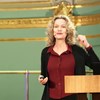obs
Tobias Hübinette: The modern history of Swedish whiteness and Swedish race thinking
Tobias Hübinette is Associate Professor in Intercultural Education and a Senior Lecturer in Intercultural Studies at Karlstad University. ABSTRACTThis presentation aims at understanding today's situati
Marc Fleurbaey: Is social progress around the corner? Insights from IPSP
Marc Fleurbaey, Robert E. Kuenne Professor of Economics and Humanistic Studies, Princeton University and Professor of Public Affairs and the University Center for Human Values ABSTRACTThe International

Offentliga samtal: Har vi blivit mer faktaresistenta?
(OBS! Bilden kommer när första talaren kommer upp på scen.) Varför pratas det så mycket om faktaresistens idag? Produktionen och tillgängligheten av kunskap har aldrig varit större än idag. Vi har he
Kasper Lippert-Rasmussen: Affirmative Action and Relational Egalitarianism
Kasper Lippert-Rasmussen, professor at the department of political science, Aarhus university ABSTRACT Traditionally, egalitarians have been concerned with distributions of income, opportunities, resour
Anca Gheaus: Feminism, basic income and equal opportunities
Anca Gheaus, Ramon y Cajal researcher at the Department of law, Universitat Pompeu Fabra ABSTRACTFeminists have always been divided about the desirability of a basic income. It is likely that a basic i
Karin Bäckstrand: The Role of Non-state Actors in Global Climate Governance after COP22 in Marrakech
Professor in Environmental Social Science, Stockholm University ABSTRACTWhat is the roles of non-state actors, such as civil society, business, indigenous movements and cities, in global climate and th Conference of the Parties (COP15) in Copenhagen to COP22 in Marrakech, where Marrakech Global Climate Action was launched involving voluntary climate action commitments from more than 12 000 companies, investors, cities and regions, and civil society actors. Over this timeframe, we have seen a form of ‘hybrid multilateralism’ emerge, in which UN climate diplomacy blurs state and non-state participation in complex and intriguing ways with implications for the authority, legitimacy, and effectiveness of climate governance. This speaks, in different ways, to the transformed landscape of climate cooperation with a strengthened interface of multilateral climate diplomacy and non-state climate action and the potential roles, modes, and effects of non-state actors in the post-Paris period.
How to be an anti-capitalist today
The American sociologist Erik Olin Wright lecture on "How to be an Anti-Capitalist in the 21st Century". What are the reasons to be "anti-capitalist" and what does this really mean? Is it still possibl
Anna Stilz: Climate displacement and territorial justice
Plats: Institutet för framtidsstudier, Holländargatan 13 in Stockholm, or online OBS! This seminar is part of a workshop and therefor takes place on a different weekday and time than usual. Research semi
Christian Munthe: The Price of Precaution
Christian Munthe, Professor of Practical Philosophy, University of Gothenburg and comments by Olle Häggström, Professor of Mathematical Statistics at Chalmers. "The Price of Precaution: Evaluating Acti








